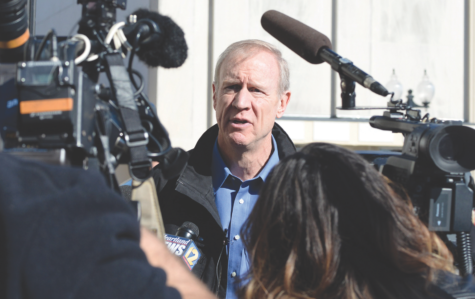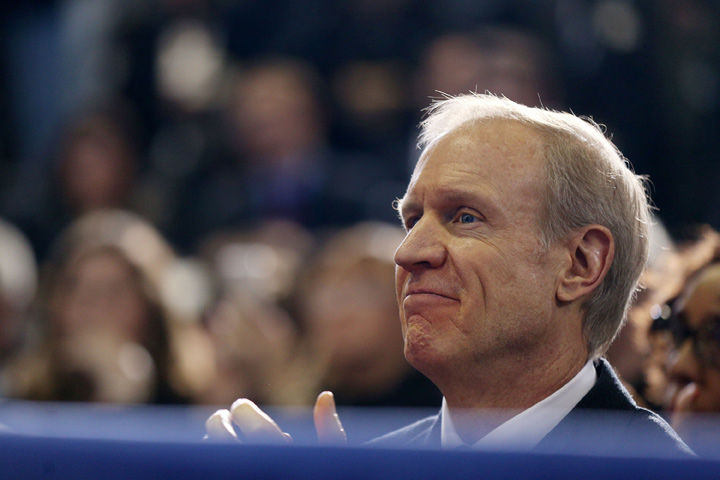Illinois governor vetoes automatic voter registration bill
August 13, 2016
Gov. Bruce Rauner vetoed a bill aimed at making voter registration automatic in Illinois, citing concerns about potential voting fraud and conflicts with federal law.
The first-term Republican governor said he wanted to continue negotiations with supporters to work out those issues, but groups backing the measure accused him of playing politics with his veto and said they would seek an override.
The legislation, approved on the final day of the spring session in May, received overwhelming support, 86-30 in the House and 50-7 in the Senate.
Advertisement
If those totals held, the governor’s move could be easily overturned, but pressure dynamics could come into play as Rauner tries to make his veto stick.
Under the legislation, starting in January 2018 people seeking a new or updated driver’s license — or other state services — would automatically be registered to vote or have their registration updated unless they opted out.
Currently in Illinois, motorists seeking services at secretary of state driver’s facilities are asked if they want to register to vote or update their registration — an opt-in form of voter registration.
Five other states have adopted what’s known as “automatic voter registration” policies in the past 18 months, supporters of the Illinois measure said.
Rauner said he has been working with Democrats and Republicans in the House and Senate to satisfy concerns with the bill, and said talks will continue.
“I strongly support efforts to encourage greater voter participation in our democracy and share the goals of this legislation,” Rauner said in a statement.
Advertisement*
“Unfortunately, as currently drafted, the bill would inadvertently open the door to voter fraud and run afoul of federal election law. We will continue working with the legislature and key stakeholders on language that meets our shared goals while complying with federal law and preventing voter fraud,” he said.
In addition, Rauner said the measure does not follow federal law, which requires a voting applicant to “attest to meeting the qualifications to vote” or to sign an application.
He said the measure also relies on the Illinois State Board of Elections to then screen out individuals who are not eligible to vote, even though it may not have access to needed information.
“Some of the agencies in possession of citizenship-related information are prohibited by federal law from sharing that information” with the elections board, Rauner wrote in his veto message to lawmakers, adding “the consequences could be injurious to our election system.”
“Agencies with access to citizenship information should use that information to verify a person’s eligibility before processing the voter registration. That responsibility should not — and legally cannot — fall to the State Board of Elections,” he wrote.
Rauner said new legislation could incorporate a recent change in the issuance of state driver’s licenses to comply with federal law. Those changes could make it easier to screen out noncitizens and others ineligible to vote before applications are sent to the elections agency.
But one group that supported the measure, Common Cause Illinois, accused Rauner of wanting to delay the proposal beyond the fall 2018 election when the governor’s office is on the ballot.

Another organization of 50 supporting groups, Just Democracy Illinois, said in a statement that “the timeline for automatic voter registration should not be pushed back based on political calculations, and we will not accept stall tactics that delay implementation any further.”
“Illinois is moving away from making the franchise more accessible, and moving toward the sort of tactics that have suppressed the vote in other states across the nation. Now is not the time for Illinois to move backward on voting rights,” the group said.
Rauner on Friday also signed legislation aimed at encouraging more sexual assault victims to report the crimes committed against them as well as creating training and procedures for law enforcement in dealing with such crimes.
The legislation, the product of a working group led by Illinois Attorney General Lisa Madigan, requires “victim-centered policies and sexual assault response training,” Madigan’s office said.
It also changes state law to allow Illinois State Police to process and test rape kits faster and extends the time for victims to consent to the testing of their forensic evidence from 14 days to five years.
“As a state, we must do everything within our power to ensure victims are supported and that their aggressors are quickly brought to justice,” Rauner said in a statement.
___
(c) 2016 the Chicago Tribune
Visit the Chicago Tribune at www.chicagotribune.com
Distributed by Tribune Content Agency, LLC.
Advertisement









Jim Russell • Aug 13, 2016 at 8:40 pm
Why is it that our flag draped, super patriotic, Constitution spouting Republican friends are always willing to restrict or make harder our most basic right, voting? But abhor any attempts to expand and make voting easier? The nice word is to “game” the system to win, more commonly known as cheating.